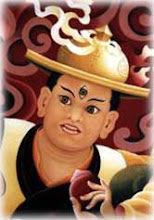There is currently a very well reasoned and interesting article on the unfortunate mixture of religion and politics in Tibetan society on Investigating the Campaign Against Dorje Shugden.
Here is an extract:
"The fact that the Dalai Lama and the Tibetan Government in Exile have been able to subject the Tibetan populace to an oath swearing campaign, whereby they promise not to engage in prayer to Dorje Shugden or have dealings with anyone who does, harkens back to the religious persecution in England during the 17th century whereby religious uniformity was mandated by the state.
That this oath swearing campaign initiated by the Dalai Lama has bypassed our conscience and our concept of religious freedom as an unalienable human right is a sign of a deeper crisis that has emerged in the Tibetan and Buddhist Community. ....
...In the Al Jazeera news footage, the interviewer asks Tsultrim Tenzin, member of the Tibetan Government in Exile, if the government debated the Dorje Shugden issue. He replied:
“There was no argument. If there was some opposition, then there will be some argument, but there is no opposition. We do not have any doubt about the Dalai Lama’s decisions. We do not think he is a human being. He is a supreme human being, and he is god, he is Avalokiteshvara, he has no interest [in] himself, he always thinks of others. Everybody is happy. Our system is everybody is happy. There is democracy, full democracy. Everyone can experience whatever he likes”
.... So what we have here is the divine right of the Dalai Lama versus the rights of individuals to practice the prayer of their choosing. Thomas Jefferson could not have scripted a better example as to why the divine right of kings and the divine right of individuals are incompatible governing principles...
Click here for the full article.





5 comments:
The TGIE has denied repeatedly that the Dalai Lama has banned Dorje Shugden practice -- e.g. blatant false statement of Tashi Wangdu at the Hamilton protests -- and yet evidence shows very clearly that the TGIE are entirely behind this same ban. Each time one of them opens their mouth, it is confirmed. They are shown to be such liars, trying to pull the wool over the eyes of their constituents and Western media, all in their fanatical defense of their religio-political leader, the Dalai Lama. Democracy?! Tibetans are currently a million miles away from it, and healthy diversity suffers as a result.
I saw a relevant article on this subject today written by a Tibetan woman who is not a Shugden practitioner but sees the problem that this mixture of religion and politics is causing for all Tibetans. http://mountainphoenixovertibet.blogspot.com/2008/10/evil-spirit-puts-tibetan-democracy-to.html
She says, for example:
"At least I ignored the topic for the longest time, thinking it's an archaic religious debate with no relevance to real life.
But then I realised that the political dimension of this conflict concerns all of us, because what had started as a theological dispute, had left the religious realm and had entered the Tibetan mainstream.
So while most of us were not qualified to make a statement with regard to the nature of Dholgyal/Shugden, as people living in a democratic society, we are all entitled to make a statement with regard to the political aspect of the controversy and how Tibetan society has been dealing with Dholgyal/Shugden supporters."
And later she says:
"If only a fraction of these stories are true, and the evidence would suggest so, they document a type of political pressure that is not normal. In fact, these reports are highly disturbing for our young democracy. In a democratic setting, it would not be possible to single out a group of people, label them and pressure them into compliance with the majority view. It's actually a fascist thing to do and conjures up the darkest memories.
If we consider our society democratic, the question is: Why do some of us tolerate or even support this type of pressure on a minority?"
Hope you get a chance to see the article.
excellent article, Janet, thanks for sharing!
Another excellent article on the corrosive mixture of religion and politics by Mongoose on this blog:
http://dorjeshugdenblog.wordpress.com/2008/10/19/mixing-religion-with-politics-the-dalai-lamas-ban-on-dorje-shugden-prayer-part-ii/#comment-32
Here is an extract:
So if you disagree with the Dalai Lama’s views on the Dorje Shugden practice, which I should highlight is a prayer — the implication being drawn here is that you are against the Tibetan national cause and must be on the Chinese Government payroll. Why should one’s religious beliefs necessarily determine one’s political allegiances? If you disagree with the Dalai Lama on the subject of a prayer why does that make you against the Tibetan cause?
We can see from this example why the Tibetan Government is characterizing the Dalai Lama’s religious views as a political ideology — because it incites a nationalistic response in the masses which is functioning to exclude all those who do not share the Dalai Lama’s religious views.
Post a Comment